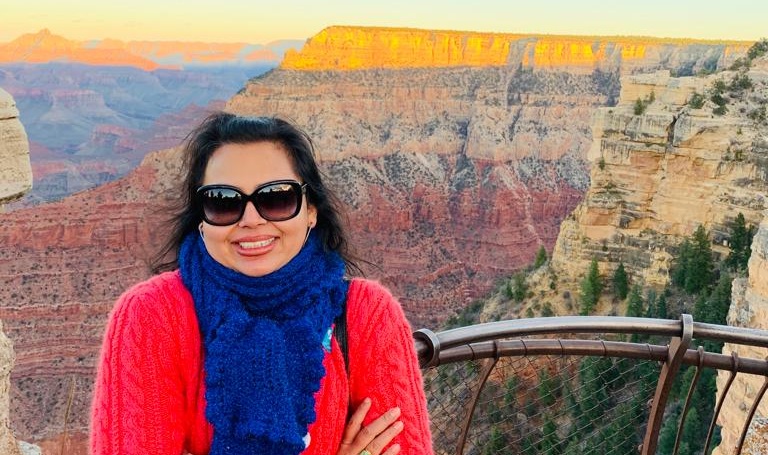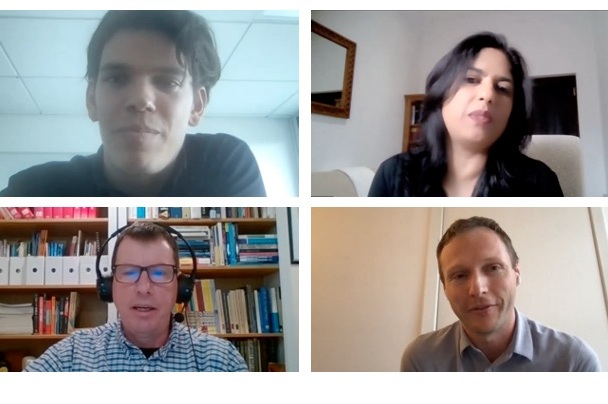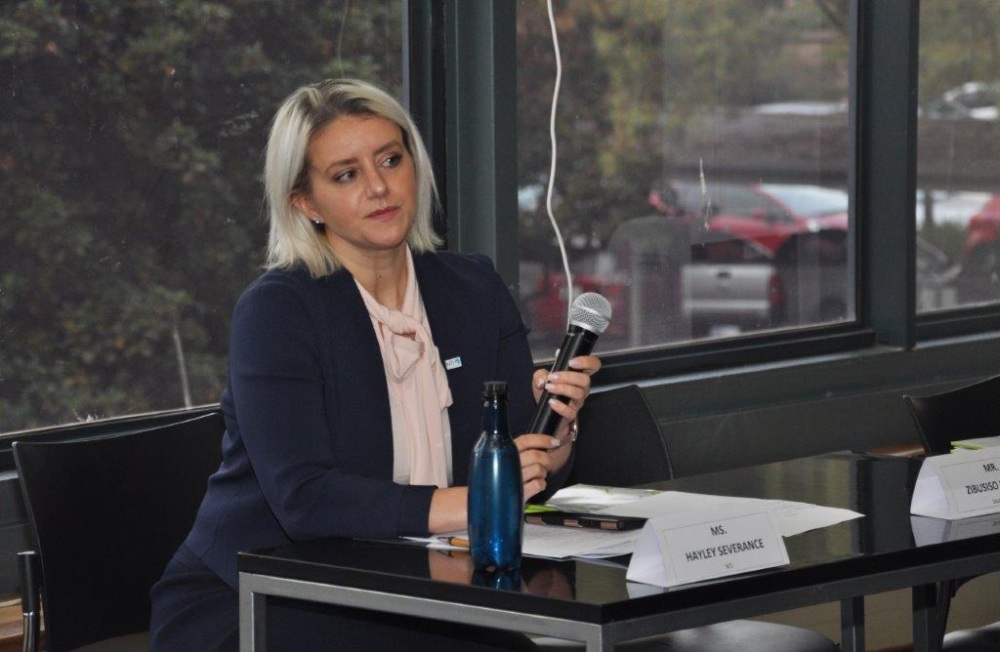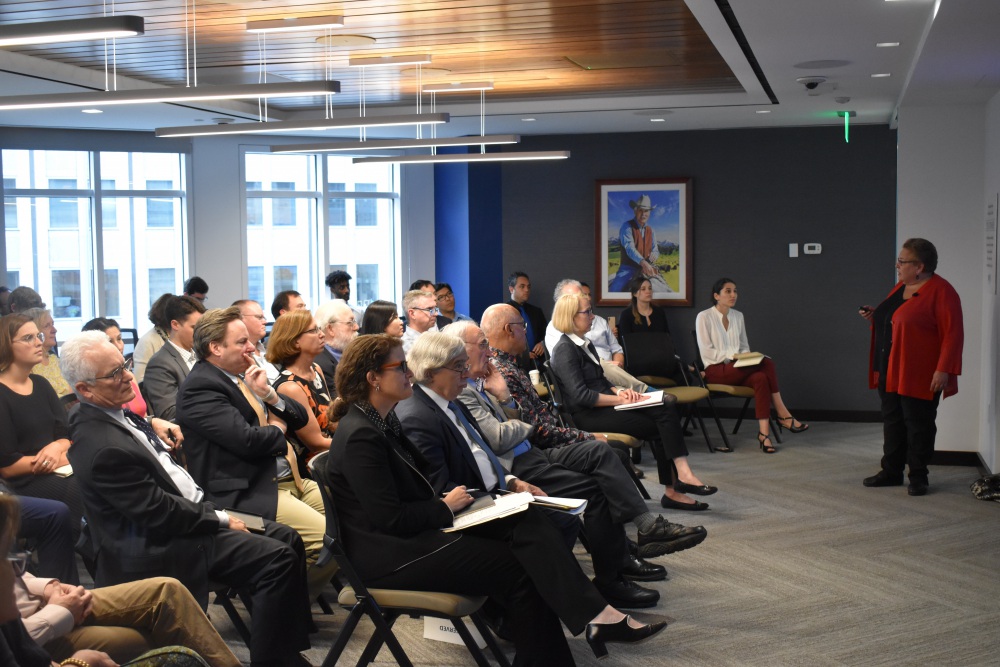
Mary Olney Fulham
Senior Communications Officer
Atomic Pulse
Aparupa Sengupta joined NTI in 2022 as a senior program officer for NTI’s Global Biological Policy and Programs team (NTI | bio), where she focuses on work to reduce the risk of catastrophic events that could result from deliberate abuse or accidental misuse of bioscience and biotechnology. She is an accomplished scientist and global health security practitioner with more than 15 years of experience across the fields of infectious disease containment, biosafety and biosecurity, and global biological risk reduction. Sengupta previously led biosafety and biosecurity programs at the University of California (Merced campus), including as the Assistant Director for Environmental Health and Safety and Director of High Containment Research Laboratories. She holds a Ph.D. in Microbiology & Applied Biochemistry, an M.S. in Molecular Genetics and Biotechnology from Michigan Technological University, and a M.Sc. in Biotechnology from Bangalore University, India. Aparupa sat down with NTI’s Mary Fulham for the latest in Atomic Pulse’s “Get to Know NTI” series.
I joined NTI on January 18, 2022—my dad’s birthday. We lost him from COVID in 2021, during the surge in India. He had a big role to play in my career path and my decision to come to NTI to work on global biological policy and risk reduction in biotechnology.
I’m an applied scientist by training. Before I came to NTI, I was working on making biological sciences in the United States safer by enforcing regulations and guidelines. Now at NTI, I still work on those issues but from a different perspective; I’m taking a step back and thinking about how those regulations and guidelines should be structured in the first place—in the U.S. and around the world. On the NTI | bio team we do this by identifying intervention points in the research life, where risks emerge, and we design concrete steps to meaningfully reduce those risks.
So that’s the big picture. The specific projects I work on are the Biosecurity Innovation and Risk Reduction Initiative (BIRRI) and the International Biosecurity and Biosafety Initiative for Science (IBBIS), the international normative entity that NTI is launching this year.
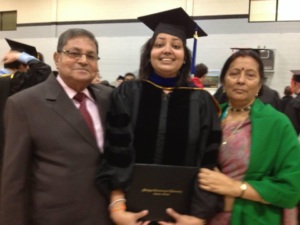 My father was always a huge cheerleader of mine, but it was actually my mom who sparked my interest originally. She studied biology and became a science teacher. In the early 2000s, she encouraged me to consider biotechnology before it was the booming field it is today. So, I got my bachelor’s and master’s in biotechnology from Bangalore University and then went to Michigan Technological University for my second master’s and Ph.D.
My father was always a huge cheerleader of mine, but it was actually my mom who sparked my interest originally. She studied biology and became a science teacher. In the early 2000s, she encouraged me to consider biotechnology before it was the booming field it is today. So, I got my bachelor’s and master’s in biotechnology from Bangalore University and then went to Michigan Technological University for my second master’s and Ph.D.
As confident as I was that I wanted to stay in the U.S. and find work in the biotechnology field, my legal status as an immigrant is dependent on my education or employment status. I had three months to find a job after graduating, otherwise I had to leave the country. I couldn’t wait around for the “perfect” first job, but I found a perfectly good first job as a lab safety scientist at my alma mater Michigan Tech that set me on my path here.
Well, my family, especially my parents, have been there for me since the beginning, but because I have had such a range of jobs, I’ve had to seek out new support systems as I go from one corner of the field to another. My Ph.D. advisor pushed me so hard that by the time I got the degree, I felt prepared for anything. Thanks to her, nothing scares me! And then as I went from Michigan Tech, to Rutgers, to University of California, I found amazing friends and mentors who were always there for me, advocating for me, and inspiring me.
To be honest, there were times when it felt difficult to keep going into spaces where I didn’t know anyone or see anyone who looked like me. But through it all, lucky for me, I was able to find people who saw beyond my skin color, believed in the value in my presence, and advocated for me.  Now that I am further along in my career, a huge goal of mine is to inspire the next generation of people who look like me to have the courage to go into less diverse spaces with confidence. We need more women and more people of color in this field—in all fields—to keep growing and learning. We won’t get diverse ideas and solutions if we don’t have diverse people in the room.
Now that I am further along in my career, a huge goal of mine is to inspire the next generation of people who look like me to have the courage to go into less diverse spaces with confidence. We need more women and more people of color in this field—in all fields—to keep growing and learning. We won’t get diverse ideas and solutions if we don’t have diverse people in the room.
It all goes back to the pandemic. When it started, I was working as the campus biosafety-biosecurity officer at the University of California, Merced. When COVID-19 hit, I was appointed COVID-19 response subject-matter expert at the university’s Emergency Operation Center and the scope of my job grew from looking out for the safety of our campus to the safety of our whole community.
As the vaccines arrived and infection rates dropped in the United States in 2021, unfortunately India’s rates surged due to the spread of the deadly delta variant, and the country’s medical system literally collapsed. My community in California was recognizing me for all I had done to withstand the pandemic, but I felt like a failure because I couldn’t help my home country or my father. He couldn’t find a hospital that would admit him or a doctor who would treat him. And we lost him. That’s when I knew I needed to do something to make my father proud and make the world a safer place than it is now.
Thank you. It was rather difficult, but it did force me to see that no one is safe if a country’s health system can collapse as quickly as India’s did. In the world that we live in, another pandemic is most likely to happen sooner or later, whether intentionally or unintentionally, so we need to focus on mitigating the risks and reducing the chances that it turns into a global catastrophe. At NTI | bio, we are doing exactly that.
I’m excited to be working on the IBBIS project because governments, industry, and academia all need an organization that will work globally to promote biosecurity norms and develop practical tools to help reduce the risk of an accidents or deliberate misuse of modern bioscience and biotechnology. Today’s advances hold so much promise; we have to make sure the great work being done isn’t undermined unintentionally or by bad actors.
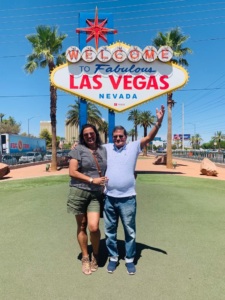 When I was growing up, I was determined to be a lead vocalist! One time, my mom helped me record audition cassettes and almost send them to Sa re ga ma (at the time, the Indian equivalent of American Idol). When my father found out, he wasn’t particularly pleased! He always said, “You’re so bright, your talent is better served by either becoming a doctor or a scientist, so one way or the other you are going to become Dr. Sengupta!” When I finally did, he said, “See? I told you so! And you have made us proud.”
When I was growing up, I was determined to be a lead vocalist! One time, my mom helped me record audition cassettes and almost send them to Sa re ga ma (at the time, the Indian equivalent of American Idol). When my father found out, he wasn’t particularly pleased! He always said, “You’re so bright, your talent is better served by either becoming a doctor or a scientist, so one way or the other you are going to become Dr. Sengupta!” When I finally did, he said, “See? I told you so! And you have made us proud.”
Now I’m just a shower singer, although my husband is very much encouraging me these days to unravel my hidden talent. So, he bought me a guitar as my birthday gift. Haha … But I don’t have any regrets—being Dr. Sengupta has been an incredible journey so far. I just wish my dad could see me working for NTI in the heart of Washington, DC. But wherever he is, I hope he is proud.
Sign up for our newsletter to get the latest on nuclear and biological threats.
Today, leaders preparing for the BWC’s Ninth Review Conference in August are exploring whether the global community can leverage increased attention and political will to strengthen the BWC by building mechanisms that increase transparency and trust with the goal of reducing the risk of global catastrophic biological events. A particular aim is determining whether there are effective and politically viable ways to enforce the treaty.
An epidemiologist focused on preventing catastrophic biological events and building health security capacity around the world, Hayley Anne Severance brought her expertise to NTI’s expanding biosecurity team in 2018.
The Future of Genome Editing: Alta Charo Presents with NTI Seminar Series
